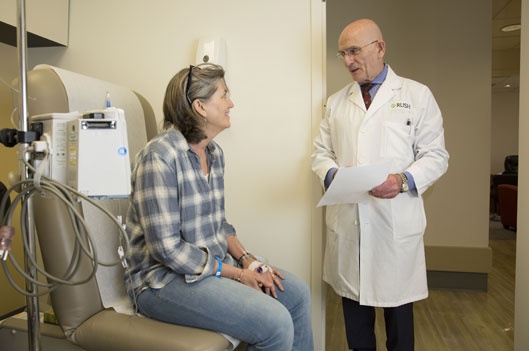CHICAGO – A new drug that is the first and only disease modifying therapy for both primary progressive and relapsing forms of multiple sclerosis (MS) is giving new hope for hundreds of thousands of Americans living with the disease. The U.S. Food and Drug Administration approved the drug for use in the U.S. in late March.
Rush University Medical Center is the first in Illinois and one of only a handful of centers in the U.S. to treat patients with the new intravenous infusion drug called Ocrevus, which is also known as ocrelizumab.
“This is the first time in history of medicine and neurology where a drug therapy can treat both forms of the disease, including relapsing-remitting MS and the more severe primary progressive MS,” said Dr. Dusan Stefoski, neurologist and director of the Multiple Sclerosis Center at Rush.
Relapsing-remitting MS is the most common form of the disease, whereas primary progressive MS is more severe, characterized by steadily worsening function from the onset of symptoms, often without early relapses or remissions. Currently, more than 400,000 people in the U.S. are living with MS.
“There are no cures for both types of MS,” Stefoski said. “Existing treatments can only reduce progression of the disease processes and of symptoms to varying degrees in relapsing-remitting MS, and no therapies at all have been effective for primary progressive MS — until now.”
“Ocrevus has been hailed by researchers and physicians as a game-changer with the potential to lead to new avenues of treatment for other diseases as well,” Stefoski said.
The approval of the Ocrevus comes after studies that have shown remarkable results for both forms of the disease.
MS leads to devastating disability
MS is a chronic, inflammatory, autoimmune disease of the central nervous system affecting the brain and spinal cord that disrupts nerve signaling among their different parts. As a result, it is among the most common causes of neurological disability in young adults and occurs more frequently in women than men.
The first episode of MS typically strikes in early adulthood and the disease advances over the years to devastating disability. Depending on where the inflammation occurs — the brain, spinal cord or optic nerves — patients can develop muscle weakness, incoordination, bladder difficulties, visual impairment and cognitive problems.
For most people with early MS, episodes of worsening, which are called exacerbations or relapses, are initially followed by recovery periods or remissions. Over time, recovery may be incomplete, leading to progressive decline in function and increased disability. Most people experience their first symptoms of MS between the ages of 20 and 40.
“MS can have a profound impact on a person’s life,” Stefoski said.
Targeting the cells that trigger MS
In MS, the immune system attacks the protective myelin covering around nerves, stripping it in patches like insulation from electrical wires. The older concept of the MS disease-mechanism has been that T cells are the main culprits, but over the past few years the role of B cells has also emerged.
Immune cells known as B cells are best known for their involvement in making antibodies through plasma cell formation but are also involved in other functions of the immune system that includes their counterparts known as T cells. Normally, antibodies attack foreign invaders and help get rid of them. But sometimes abnormal antibodies develop that attack its own body by mistaking myelin for harmful agents. At other times, and probably more significantly, B cells can induce T cells to attack myelin.
“We have known for many years that patients with MS have exaggerated levels of antibodies in their spinal fluid,” said Stefoski. “This was one of the reasons for considering to treat MS patients with an anti B cell-directed therapy.”
“A big surprise was the observation that the abnormal spinal fluid antibodies in patients were not changed after B cell depletion, while patients nonetheless benefited from great reductions in new attacks,” Stefoski said.
This observation meant that B cells clearly were involved in relapses, but because of something other than antibodies. By carefully studying patients before and after treatment, researchers learned that B cells of MS patients abnormally influence T cells, making them more aggressive.
MS attacks are driven by interactions between B cells and T cells, which is why eliminating B cells with Ocrevus is so effective against relapses.
Ocrevus is an antibody that targets the CD20 molecule on the surface of B cells, allowing for their destruction.
It is extremely effective for relapsing-remitting MS, which is caused by removing B cells from circulating in the blood that would have been bound for the nervous system, to orchestrate inflammation.
Treatment is easy to tolerate and has been found effective
Ocrevus is given to patients through an infusion every six months.
“Another advantage is that Ocrevus is overall quite easy to tolerate. After the initial two infusions, which are administered two weeks apart,” Stefoski said. “Subsequent infusions are once every six months.”
The efficacy of Ocrevus for the treatment of relapsing forms of MS was shown in two clinical trials in 1,656 participants treated for 96 weeks. Both studies compared Ocrevus to interferon beta-1a (Rebif), which is another MS drug. In both studies, the patients receiving Ocrevus had reduced relapse rates and reduced worsening of disability compared to the other drug therapy.
In a study of primary progressive MS in 732 participants treated for at least 120 weeks, those receiving Ocrevus showed a significantly longer time to the worsening of disability compared to placebo.
Media contact
Deb Song
(312) 942-0588
deb_song@rush.edu

